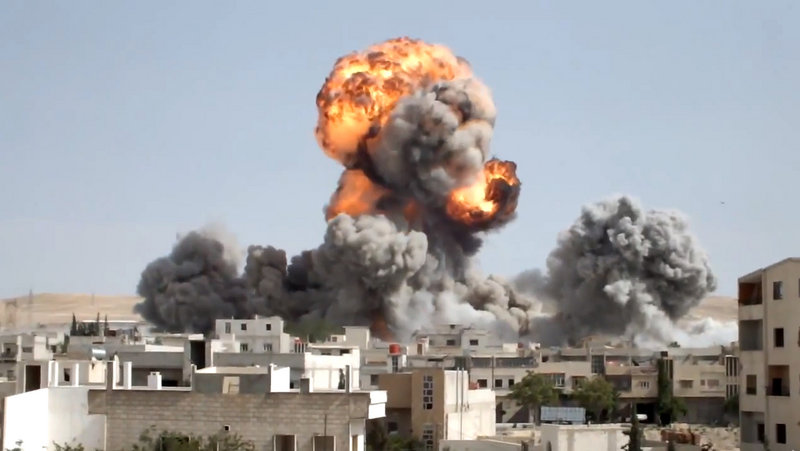BEIRUT – The Syrian military onslaught this week against the strategic town of Qusair has dramatized a surprising combat resiliency that has already put rebel forces on the defensive on other key fronts, including near the capital, Damascus.
The military’s still-robust fighting ability — apparently bolstered in Qusair by the presence of combatants from Hezbollah, the Lebanese militant group — has confounded predictions from experts and foreign capitals that the Syrian government’s days were numbered.
Some are revising their forecasts of the regime’s certain demise, even as Russia and the United States try to organize an international conference meant to jump-start peace talks and create a transitional government in Syria.
In recent weeks, forces loyal to Syrian President Bashar Assad have scored significant victories in the south and north, while pushing back rebel forces that not long ago seemed poised to storm the capital. The fractured opposition complains that weapons and ammunition are becoming scarce and money is drying up.
The latest assault on Qusair, near the Lebanese border, which began Sunday after a long siege by the military, is just the latest indication that the government side still has a lot of punch — despite heavy casualties, mass defections and the loss of vast stretches of Syrian territory.
At least 90 people have been killed in two days of fighting in Qusair, according to the Syrian Observatory for Human Rights, a British pro-opposition group.
Qusair had been a rebel bastion for more than a year, a way station for weapons and supplies destined for combatants in nearby Homs, a city long at the heart of the rebellion.
The government has thrown troops, air power and artillery against the rebel forces in Qusair, demonstrating its continued dominance in firepower. Assertions that the regime’s armor and aircraft would wear down from steady action and a lack of spare parts do not appear to have been borne out.
The fall of Qusair would be a severe blow for rebels in Homs and other nearby opposition-controlled cities, such as Rastan, and would solidify government control of the main highways between the capital and the Mediterranean coast, homeland of Assad’s Alawite minority, which controls the nation’s security apparatus.
“The weapons and aid to Homs are coming through us,” said Muhammad Raed, a rebel reached via Skype in Qusair. “So if Qusair falls, then Homs falls.”
Others say the loss of Qusair may not be quite as catastrophic for the opposition. The long Lebanese border offers other entry points for materiel and fighters destined for rebels in the area. Nearby Sunni Muslim villages probably will still aid rebels, who are mostly from Syria’s Sunni majority. And the fall of Qusair would not affect supplies to rebel strongholds in northern Syria.
Still, just a few months ago it seemed that rebels were about to cut key routes across the country and isolate government forces in places such as the northern city of Aleppo, where the military has hung on through almost nine months of fighting. In March, rebels regularly were seizing towns, military bases, dams and oil fields. They even overran Raqqah in north central Syria, the first provincial capital to fall into opposition hands.
In mid-April, however, the military broke a six-month rebel siege of two military bases in the northern province of Idlib, reopening a key overland supply line to troops in Aleppo. That freed aircraft that had previously been resupplying the Aleppo garrison. The government has recorded a series of victories since then.
In the case of Qusair, fierce clashes continued Monday, and opposition activists disputed government accounts that the town had been largely recaptured. The official Syrian news service declared that the army had “restored security and stability” to the town, while capturing weapons caches, destroying tunnels used as shelters and eliminating “large numbers of terrorists, most of them non-Syrians.” The government routinely refers to opposition fighters as terrorists.
Both sides have tried to seize on the narrative that their opponents include legions of foreigners. The government has pointed to the presence of Islamic militants from North Africa and Europe among the rebels, while the opposition condemns the presence of Shiite Hezbollah militiamen from Lebanon — fighting with Syrian troops.
Send questions/comments to the editors.



Success. Please wait for the page to reload. If the page does not reload within 5 seconds, please refresh the page.
Enter your email and password to access comments.
Hi, to comment on stories you must . This profile is in addition to your subscription and website login.
Already have a commenting profile? .
Invalid username/password.
Please check your email to confirm and complete your registration.
Only subscribers are eligible to post comments. Please subscribe or login first for digital access. Here’s why.
Use the form below to reset your password. When you've submitted your account email, we will send an email with a reset code.